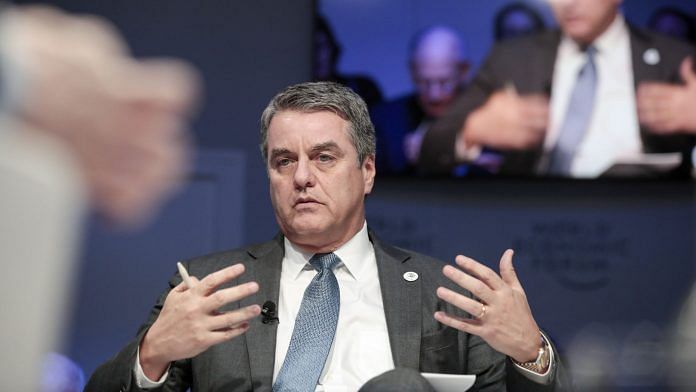Geneva/Washington: The World Trade Organization’s top official, Roberto Azevedo, has told member governments he plans to step down before his term ends in 2021, according to four people familiar with the matter.
The 62-year-old Brazilian has served as the WTO’s director-general since September 2013 and his second four-year term began in September 2017.
A WTO spokesman declined to comment. Azevedo couldn’t be reached directly.
His departure, expected to be effective Sept. 1, would come at a precarious time for a global economy that’s suffering the worst downturn since the Great Depression because of the coronavirus pandemic — with trade worldwide projected to recede to historic lows and trade policies becoming a contentious political issue from Brussels to Beijing. Internally, the Geneva-based trade body was already struggling with an array of crises before the blow to international commerce.
The WTO has become a symbol of multilateral malaise following its failure to conclude the Doha negotiating round. More recently the trade body has become a lightning rod of criticism for the Trump administration, which argues that China has not fulfilled its 2001 commitments to embrace a more market-oriented economy.
Now, Beijing’s inability to contain the health crisis has emboldened the WTO’s critics, particularly inside the Trump administration and among its allies in Congress.
Senator Josh Hawley, a Republican senator from Missouri, said in a New York Times opinion article on May 5 that the WTO was an outmoded “relic” that should be abolished so the U.S. can better fight Chinese “imperialism.” He’s calling for a congressional vote this year for the U.S. to quit the WTO.
The WTO has three main functions: help negotiate multilateral trade deals, settle cross-border commercial squabbles and serve as a repository for members’ trade policies. The first two are essentially dead, partly because of an assault by Washington.
One of those key functions was dealt a major blow last year when the U.S. effectively paralyzed the organization’s dispute-settlement system by blocking new appointments to the seven-member panel that hears appeals. A quasi-supreme court for trade, the WTO appellate body is now unable to issue judgments on future cases as of Dec. 11 because there aren’t enough active members.
Successor Search
Azevedo’s surprise early departure clouds the organization’s future and may set up a relatively hasty process to replace him. Typically, the procedure to select the WTO’s top job begins nine months before the expiration of the current director-general’s term. With Azevedo’s premature exit, WTO members may decide to begin the selection process immediately if all 164 members choose to do so by consensus.
At least two candidates have previously announced their intention to replace Azevedo in the top job:
- Abdelhamid Mamdouh, an Egyptian attorney at King & Spalding LLP and former Director of the Trade in Services and Investment Division of the WTO
- Yonov Frederick Agah of Nigeria, who is currently a WTO deputy director-general.
The search may be complicated by the fact that it will largely be conducted online because of the WTO’s pandemic restrictions on in-person meetings.
If WTO members are unable to pick a new director-general by Sept. 1, one of four deputy directors-general may serve as an interim caretaker. They are Agah of Nigeria, Karl Brauner of Germany, Alan Wolff of the U.S. and Yi Xiaozhun of China.
Neither an American nor a Chinese national has ever served as the WTO’s director-general since it was formed in 1995.
Going back to his 2016 campaign, President Donald Trump has called the WTO the worst trade deal the U.S. ever made, mainly because China was allowed to join in 2001 — a move that was supposed to speed Beijing’s reforms toward a more market-based system integrated with the world economy. That happened far too slowly for some critics.
In a New York Times op-ed piece on Tuesday, U.S. Trade Representative Robert Lighthizer said, without singling out the WTO, that the U.S. has lost at least 2 million jobs since 2001.
As recently as January, it appeared Trump had a willing partner in Azevedo for reform. The two men gave an impromptu press conference in Davos, Switzerland, where the U.S. president declared that they had discussed a “very dramatic” change for the WTO’s future.
“We’re talking about a whole new structure for the deal or we’ll have to do something,” Trump said at the time.
Azevedo sounded agreeable, acknowledging that a dose of theatrics might just be the antidote for curing what ails the WTO.
“If we are serious about changing and updating the WTO to make it more responsive to the changes of the 21st century, we need to be ready to be do things that are unusual, that are important, that are maybe even dramatic,” he said in January.- Bloomberg
Also read: WTO says global trade collapse may be worst in a generation



